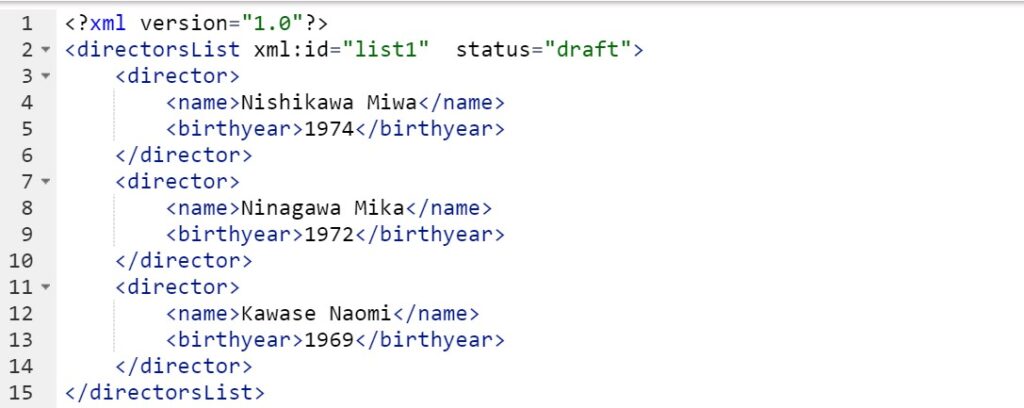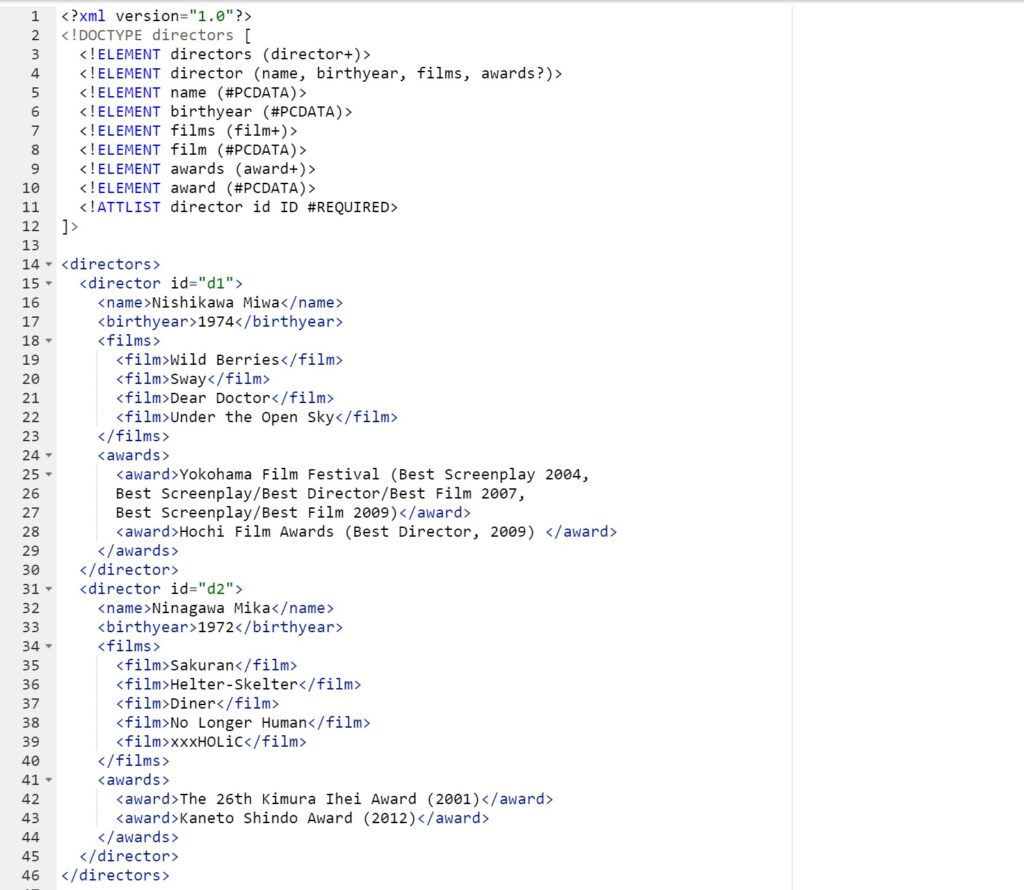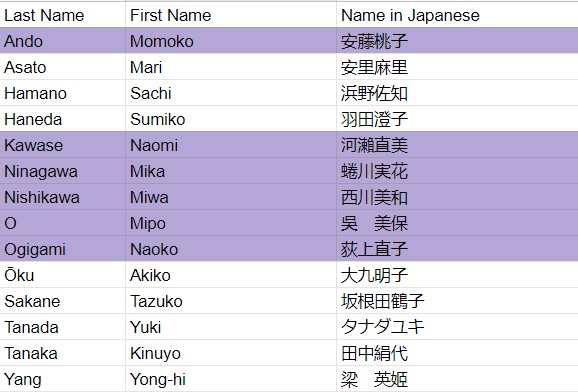Introduction: For the final project, I propose to design custom markup schemas and tagsets for encoding research writings we make on Japanese women directors. The project is a digital experiment searching for methods to create research-based DTD (Document Type Definition) that contain critical and interpretative tags which we use to deliver bio details on birth, name, family, education, and significant life events but also marks the contextual information on women directors’ career paths, such as team, co-worker, award, organization, company, funding, social movement, dual profession, etc. I will post my abstract, examples I create to explain XML/DTD, director names I collect, and feminist markup projects I refer to for your reference.
NOTE: A Document Type Definition (DTD) is a set of rules that define the structure of an XML file. A well-formed XML document does not require a DTD and can just follow common rules but creating a DTD can ensure the integrity and consistency of the XML document. Our project will define elements, attributes, relationships, and constraints to customize the DTDs to give interpretive information in greater detail.
Abstract: Asian women’s images in the film industry have long been filtered through a Western male gaze and thus have been historically objectified as exotic and fetish beauties. Asian women filmmakers’ efforts also do not receive the same attention in a male-dominated film culture of auteurism. However, within the past few years, we have seen rising Asian women directors in the industry and their films gaining recognition. A generation of Asian women directors has achieved success in domestic and international film circles, including Yoon Ga-eun, Kawase Naomi, and Chloé Zhao, to name a few. In the meantime, there is also an emerging group of scholars working on introducing, translating, and analyzing these women’s works to reshape the images of Asian women in film studies. The Japanese Women Directors Project (JWDP), a public-facing platform that creates open educational resources featuring women’s voices in the Japanese film industry, represents a step in the new direction of cinema feminist interventions.
This project builds upon Phrase 2 of the JWDP, which explores ways of constructing director profile pages and producing the scholarly history of studies on Japanese women as creators in the film industry. Our project aims to use descriptive markup language (Extensible Markup Language) to encode interpretive entries as the research on Japanese women directors is being carried out. We plan to serve the needs of educators, students, and the public, who expect to efficiently find a broader range of genres and styles produced by women directors. Unlike other TEI (Text Encoding Initiative) projects that annotate and store the structural elements in preexisting textual materials, our project is experimental to the extent that we are encoding research writings that we are currently making. The result of this project contributes to Phrase 3 of the JWDP, which delivers our born-digital encoded content through a searchable database.
Examples of XML/DTD I made:

The start tag (e.g., <director>) marks the point in the sequence that an element starts, and the element closes with the end tag (e.g., </director>). We can also add attributes to the document. Here attribute values are specified for the <directorsList> element through the attributes xml: id and status. Later an XML processor can recognize this <directorList> as a draft instead of the final version, and the “list1” could label its element occurrence for later cross-reference works.

In this example, the DTD is defined within the DOCTYPE declaration. The DTD specifies that the document’s root element is <directors>. The root element can contain one or more <director> elements. Each <director> element must have an id attribute and can contain a <name>, a <birthyear>, a <films>, and an optional <awards> element.
The above examples are just at a very minimal level and the final step is to build a delivery system using XSLT, Java-related technologies, and Apache Tomcat that allows users to search and navigate the data we create.
Women directors for the first trial: When we use the words “Japanese” and “women” to identify our research targets, we are referring to all directors self-identified as women, including Japanese women working outside Japan and non-Japanese women working in Japan. The first trial of this project will be very specialized, covering a range of fifteen Japanese women directors who make live-action narrative films. We hope to monitor the trial’s progress and expand the scope in a later stage to include women working on other genres, such as animation, documentaries, and experimental films. The primary objective of this project is to create a structured and organized database of Japanese women directors encoded by XML (Extensive Markup Language), making it easier to search and retrieve specific pieces of information on relevant subjects in their lives and works, such as education, employment, production, network, and social work.

Feminist markup projects:
Orlando: Women’s Writing in the British Isles from the Beginnings to the Present
Women Writer’s Online (WWO)
Digital Mitford: The Mary Russell Mitford Archive
Read more:
Beshero-Bondar, Elisa, Raffaele Viglianti, Helena Bermúdez Sabel, and Janelle Jenstad. “Revising Sex and Gender in the TEI Guidelines.” Accessed December 22, 2022, https://doi.org/10.5281/zenodo.7091048.
Brown, Susan, Patricia Clements, and Isobel Grundy, eds. “Introduction.” Orlando: Women’s Writing in the British Isles from the Beginnings to the Present. Cambridge University Press, 2022. Accessed December 22, 2022, https://orlando.cambridge.org/about/introduction.
Cummings, James. “The Text Encoding Initiative and Study of Literature.” In A Companion to Digital Literary Studies, edited by Susan Schreibman, Ray Siemens, and John Unsworth, 451–476. Malden, MA: Blackwell Pub., 2004.
Pierazzo, Elena. “Textual Scholarship and Text Encoding.” In A New Companion to Digital Humanities, edited by Susan Schreibman, Ray Siemens, and John Unsworth, 307–321. Chichester: John Wiley & Sons, Ltd., 2016.
The TEI Consortium. “TEI P5: Guidelines for Electronic Text Encoding and Interchange.” Last updated October 25, 2022. https://tei-c.org/release/doc/tei-p5-doc/en/Guidelines.pdf.
Wernimont, Jacqueline. “Whence Feminism? Assessing Feminist Interventions in Digital Literary Archives.” Digital Humanities Quarterly 7, no. 1 (2013). http://www.digitalhumanities.org/dhq/vol/7/1/000156/000156.html.


